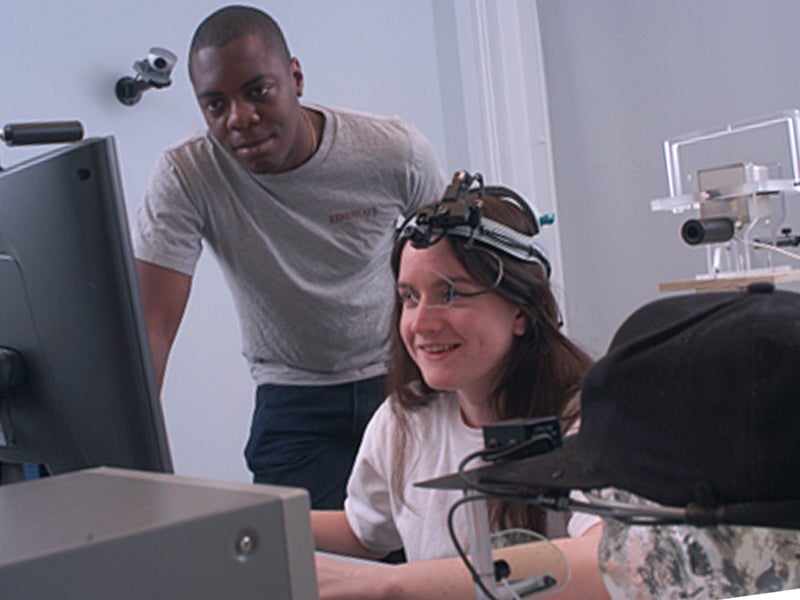A truly interdisciplinary approach to cognitive science education – at the intersection of psychology, computer science, and philosophy – with important links to neuroscience, linguistics, anthropology, mathematics, biology, and education.

Program Overview
Discover a broad, interdisciplinary, and fast-growing field.
In addition to having a strong computational emphasis, the B.S. in Cognitive Science at Rensselaer combines psychology and philosophy with disciplines such as neuroscience and linguistics to equip students with the reasoning, communication, and analytical skills needed to succeed in a diverse field.
The B.S. in Cognitive Science at Rensselaer studies cognitive phenomena such as reasoning, decision-making, memory, learning, language, perception, and action. The field of cognitive science is used to understand the human mind, one of the most complex entities in the known universe, as well as animal and artificial minds.
With applications such as the creation of intelligent machines or the design of speech recognition systems, cognitive science has the potential to transform lives.
Program Highlights
Understanding Minds and Intelligence
Cognitive Science at RPI explores how humans and machines think, learn, and act. Students study perception, language, memory, and reasoning through an interdisciplinary mix of psychology, computer science, philosophy, neuroscience, and linguistics. The program investigates the principles that underlie both natural and artificial intelligence.
Integrated, Interdisciplinary Training
The curriculum builds strong foundations in logic, computation, and scientific research methods. Students can tailor their studies toward areas such as artificial intelligence, cognitive modeling, human-computer interaction, or cognitive neuroscience, gaining both technical and theoretical fluency.
Research and Discovery
Undergraduate research is a central feature of the program. Students collaborate with faculty in laboratories investigating topics from machine learning to decision-making, preparing to apply cognitive principles in shaping future technologies and understanding the human mind.
Curriculum overview
This page provides a high-level summary of program requirements unique to the Cognitive Science B.S. program. For complete details, please see the official Rensselaer Catalog via the links provided below.
Math/Science Requirements
MATH 1010 and MATH 1020: Calculus I and II
CSCI 1100 – Computer Science I
CSCI 1200 – Data Structures
CSCI 2200 – Foundations of Computer Science
CSCI 2300 – Intro to Algorithms
Required Courses (students take all 4)
INQR 1140 – Minds and Machines
COGS 2120 – Introduction to Cognitive Science
PHIL 2140 – Introduction to Formal Logic
PSYC 2310 – Research Methods & Statistics I
Choose one of the following
PSYC 4370 – Cognitive Psychology
COGS 2340 – Introduction to Linguistics
COGS 4330 – Introduction to Cognitive Neuroscience
Choose one of the following
COGS 4210 – Cognitive Modeling
CSCI 4150 – Introduction to Artificial Intelligence
PSYC 4350 – Mathematical Methods in Psychological Science
PSYC 4410 – Sensation and Perception
Choose one of the following
PHIL 4130 – Philosophy of Science
PHIL 4480 – Metaphysics and Consciousness
Cognitive Science Electives (choose 3 courses)
Students choose three courses from a wide range of approved electives, based on their interests. See the Rensselaer Catalog for the list of approved Cognitive Science elective courses.
Culminating Experience
Students can satisfy this requirement by completing an Undergraduate Thesis, by taking an Advanced Seminar course, or by participating in research with a faculty mentor through the Undergraduate Research Program. Advanced Seminars are upper-level courses with small class sizes and a hands-on or project focus.
For More Information
For complete details on the Cognitive Science B.S. program requirements, as well as a listing of current courses offered, please see the official Rensselaer Catalog. Note that program requirements are specific to the academic year you started at RPI. Use the drop-down box at the top-right of the Rensselaer Catalog page to select the appropriate year.
For questions regarding the Cognitive Science B.S. program, please contact:
Cognitive Science Program Coordinator: Prof. Bram Van Heuveln (heuveb@rpi.edu)
Undergraduate Program Director: Prof. Chris Sims (simsc3@rpi.edu)
HASS Student Services Advising Hub (hassinfo@rpi.edu)
Program Outcomes
Students who graduate from this program will have:
- Conceptual foundations and reasoning skills — The ability to critically evaluate conceptual foundations of cognitive science from philosophy, psychology, computer science, neuroscience, linguistics, and anthropology, through careful logical reasoning and argumentation, and to clearly communicate these ideas and arguments in written or oral form.
- Experimental design and evaluation skills — The ability to design and run experimental studies and evaluate empirical findings through statistical methods to test theories regarding mind, brain, and behavior.
- Formal modeling skills — The ability to use logic, mathematics, programming languages, cognitive architectures, and other formal methods to produce and research mathematical and computational models of human cognition and artificial intelligence.
After Graduation
A degree in cognitive science prepares students for:
- Careers in the information industry, human-factors engineering, artificial intelligence, human-performance testing, and education.
- Graduate studies in cognitive science, computer science, psychology, philosophy, neuroscience, artificial intelligence, information technology, economics, linguistics, anthropology, education, and law.
“RPI’s cognitive science program is wonderful: It’s innovative, well organized, comprehensive, challenging, and interesting. The professors are extremely passionate about their areas of study and always go above and beyond to maintain environments conducive for their students to best learn."
— Olivia Fryt ’16
Top Employers:
- Amazon